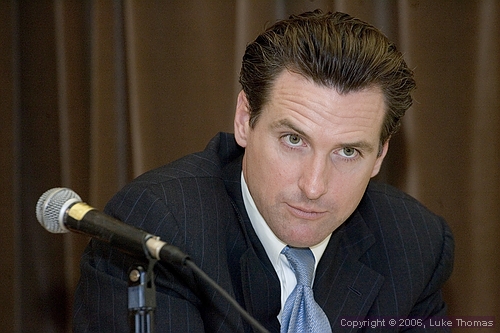Newsom report ties Earthlink Wi-Fi deal
to San Francisco digital inclusion promise

Mayor Gavin Newsom. File photo (10/23/6)
Photo(s) by
Luke Thomas
By Tamara Barak, Bay City News Service
January 16, 2007
SAN FRANCISCO (BCN) - San Francisco Mayor Gavin Newsom
today released a report outlining the city's efforts to bridge
the digital divide that separates its low-income, elderly, and
disabled citizens from the benefits of technology.
The report, called the Digital Inclusion Strategy, aims to build
on the Jan.
5 deal between the city and Earthlink to offer free wireless
Internet access throughout the city.
The report was put together over nine months by the city's Department
of Telecommunications and Information Services, along with the
13-member Digital Inclusion Task Force, made up of community-based
technology stakeholders.
"Several years ago, we decided not just to identify the
realities of the digital divide, but begin to address them,"
Newsom said at a press conference at Balboa High School today.
While ubiquitous Wi-Fi promises to enhance residents' lives by
easing their access to education, information and city services,
"we're leaving literally hundreds of thousands of San Franciscans
behind," Newsom said.
Wi-Fi is just one piece of the puzzle, he said.
"Not everyone knows what a portal is. Not everyone understands
what broadband is. Not everyone knows the benefits technology
can provide. You need the tools, you need the hardware, the training."
In addition to free wireless Internet access, the Digital Inclusion
Strategy outlines five other elements for closing the digital
divide: computer ownership and basic training, digital safety
and responsibility, enhanced digital literacy programs, multi-language
Internet content and online services and accessible solutions
to accommodate seniors and people with disabilities.
The plan proposes multiple ideas for each of its proposals. Strategies
for providing computers and equipment to low-income families,
for example, include developing a low or no-interest computer
purchase program by partnering with technology vendors, then distributing
the equipment and providing training through the San Francisco
Unified School District.
Another possibility is organizing technology fairs in the city's
low-income neighborhoods where participants can sign up for the
computer purchase programs and refurbished computer vendors can
collect donated equipment to fix up and sell at a discount.
Other ideas in the plan include holding city-sponsored online
safety seminars for parents, promoting technologies that help
the visually impaired, partnering with nonprofits to provide multi-lingual
technology support, offering one-day training events staffed by
volunteers, and enlisting the help of community colleges to bring
computer courses to San Francisco neighborhoods.
Annie Chung, acting chair of the Digital Inclusion Task Force,
said that through conducting computer classes for the elderly
in Chinatown, she has seen firsthand the world that opens up when
seniors learn about technology.
"It's so gratifying to see an 80-year-old senior upload
a picture of a grandchild to share," she said.
Sister Petra Chavez of Caminos Pathways Learning Center said
the plan will further the work of her organization, which provides
technology education to immigrant women.
"The use of computers and the Internet has changed what
employers look for, how people apply for jobs, how communities
solve problems. Those without access are perhaps more disadvantaged
now than they were before the digital revolution," Chavez
said. "Without a technology inclusion plan, they're left
out. Digital inclusion cannot be considered a luxury."
Balboa High School student and aspiring writer Christopher Green
said he's looking forward to seeing the plan implemented in his
school. Last year, he participated in a playwriting internship
offered through Balboa High and the otherwise great experience
was hampered by lack of technology, he said.
"One of the things that held us back was networking and
communication. The students would run into technical problems
caused by their slow Internet connection when transmitting their
plays electronically to their mentors and their directors.
"It was a hindrance to our inspiration and our productivity,"
he said.
Copyright © 2007 by Bay City News, Inc. -- Republication,
Rebroadcast or any other Reuse without the express written consent
of Bay City News, Inc. is prohibited.
####
|